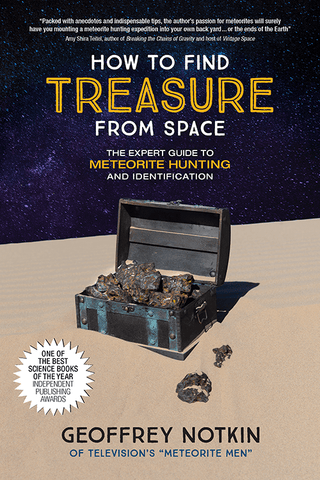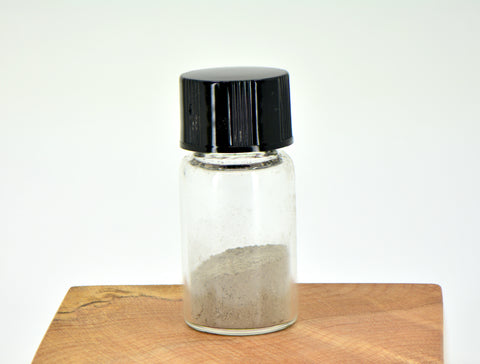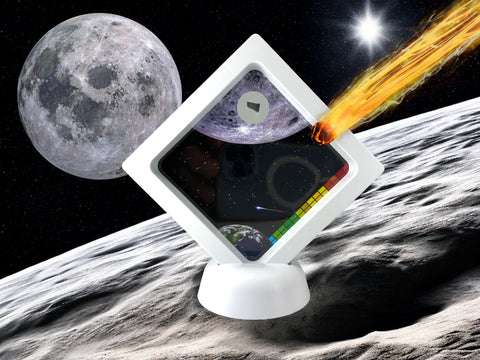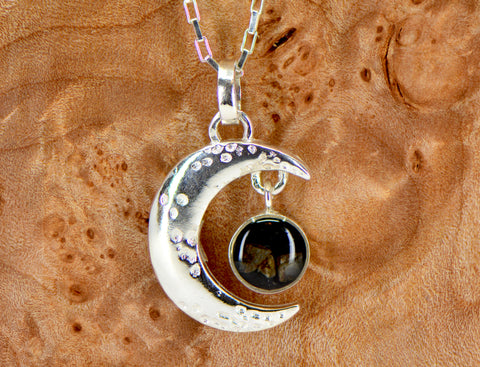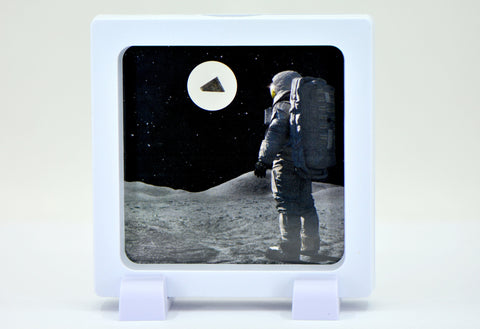Lunar Meteorite Jewelry I The Moon Bar Necklace

The Moon Bar necklace - lunar meteorite pendant
The Moon Bar Center Stone: Hand shaped Lunar Meteorite. This is a real piece of the Moon that was ejected by a meteorite impact on the surface of our Moon. The ejecta from that impact eventually landed on Earth as a meteorite. This lunar meteorite is classified as a Feldspathic Lunar Breccia, and was recovered from the dry deserts of Northwest Africa.
Setting and Chain (optional): 925 Silver
Description: Moon Bar is a unique handcrafted Lunar Meteorite Pendant with center stone fashioned from a piece of the Moon. Made from the beautiful lunar meteorite Arabian Peninsula 007 and set in Sterling Silver. Accompanying 18" Sterling Silver necklace is available for $25 additional.
Dimensions not including bail: Approximately 8mm x 5mm x 5mm
Dimensions including bail: Approximately 16mm x 5mm x 5mm
Official name: Arabian Peninsula 007
Type: Lunar fragmental regolith breccia
Year Found: 2017
Country: Saudi Arabia
Parent body: The Moon - this material was ejected from our only natural satellite when the Moon was hit by another meteorite. It should be noted that we do not know exactly which crater this lunar meteorite was ejected from.
This beautiful moon pendant has been hand crafted and assembled in the US by AZ based artisan Josh Eisler. Each pendant has a unique center stone and it is a completely unique part of the Moon. No two pendants are exactly alike. The center stone for this pendant was ejected from the Moon and recovered in Mali by camel shepherds in 2021. The center stone has been free-hand shaped to find the best qualities in each area of the stone, and making every piece totally unique. The pendant is set in .925 Sterling Silver.
The story: Our Moon takes a lot of hits. This is evidenced by the millions of craters that cover the moon's surface. Thankfully the bombardments have slowed down considerably in the last few hundred thousand years, but they still do occur from time to time. Lunar meteorites are material ejected from our Moon's surface when it gets hit by a meteorite. If the impact has enough energy, some of the ejecta gets thrown so far it escapes the Moon's gravity becoming meteoroids hurtling through space. Some of those lunar meteoroids have the potential to eventually fall into Earth's gravity well and go screaming through the atmosphere to hit the surface. Once they hit the Earth's surface, they earn the designation of being a meteorite. Much later, perhaps thousands of years later, an even smaller fraction of the meteorites that didn't fall into the oceans or onto unrecoverable terrain, are recovered by nomads and others who happen to find them. Nothing short of miraculous odds. To describe them as rare, is perhaps an understatement.
| Arabian Peninsula 007 | |||||||||||||||||||||||||||||||||
|---|---|---|---|---|---|---|---|---|---|---|---|---|---|---|---|---|---|---|---|---|---|---|---|---|---|---|---|---|---|---|---|---|---|
| Basic information |
Name: Arabian Peninsula 007 This is an OFFICIAL meteorite name. Abbreviation: AP 007 Observed fall: No Year found: 2017 Country: Saudi Arabia Mass:  1337 g 1337 g |
||||||||||||||||||||||||||||||||
| Classification history: |
This is 1 of 26 approved meteorites classified as Lunar (frag. breccia). [show all] Search for other: Lunar meteorites |
||||||||||||||||||||||||||||||||
| Comments: | Approved 15 May 2019 | ||||||||||||||||||||||||||||||||
Writeup |
Writeup from MB 108:
Arabian Peninsula 007 (AP 007) Saudi Arabia Purchased: 2017 Nov Classification: Lunar (frag. breccia) History: A single weathered stone lacking a fusion crust was found in 2015 by a pair of local meteorite hunters in the Al Jouf region of Saudi Arabia. Purchased by Dustin Dickens in November 2017 while on expedition in the region. Physical characteristics: Dark, sand-blasted exterior. Dark homogeneous groundmass with sub-mm sized clasts. Mm-width melt veins visible across exterior. No fusion crust. Petrography: (T. S. Hayden, M. Anand, OU) The meteorite is a clast-rich fragmental breccia containing numerous mineral and lithic fragments embedded in a fine-grained matrix. The lithic clast population consists primarily of basaltic clasts, dominated by Ca-rich pyroxene and plagioclase and olivine. There is a large (~2.3mm) granulite clast which appears to be of the ferroan anorthosite suite, with accessory apatite and ulv_spinel. The size range of the lithic clasts is 0.24-3.41mm. Mineral clasts and fragments are mainly pyroxene, olivine, plagioclase and chromite. Some regolith material (vesicular) present also. Geochemistry: Mineral composition and Geochemistry: (T. S. Hayden, M. Anand, OU) Feldspar (An96.4±0.8Ab3.5±0.8, N = 79), Pigeonite (Fs32.1±3.2Wo13.6±3.2, Fe/Mn=59.4±4, N=41), Augite (Fs25.8±5.6Wo28.6±7.5, Fe/Mn=57.1±6.8, N=18), Olivine (Fa41.6±9.8, Fe/Mn=103.3±10, N=116). O isotopes (measured at OU): δ17O = 3.484‰, δ18O = 6.646‰, Δ17O=-0.002‰ (linearized using a slope of 0.5247). Classification: Lunar fragmental regolith breccia Specimens: Specimen: 21g type specimen held at OU. Main mass held by Dustin Dickens. |
||||||||||||||||||||||||||||||||
| Data from: MB108 Table 0 Line 0: |
|
||||||||||||||||||||||||||||||||
| Plots: | O isotopes: |
||||||||||||||||||||||||||||||||
| Institutions and collections |
OU: Planetary and Space Sciences Department of Physical Sciences The Open University Walton Hall Milton Keynes MK7 6AA United Kingdom, United Kingdom (institutional address; updated 8 Dec 2011) | ||||||||||||||||||||||||||||||||
We Also Recommend







